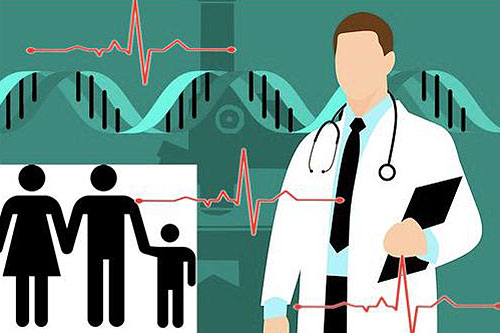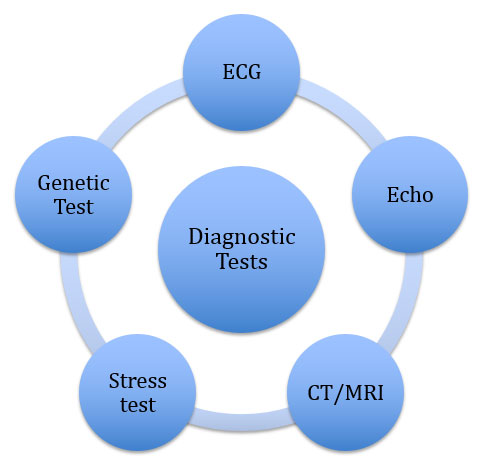Understanding Inherited Heart Diseases
Cardiovascular diseases, or diseases of the heart and blood vessels, are the leading cause of death and disability globally. While a majority of heart ailments like heart attack and heart failure are multifactorial in origin, there are some that have a strong genetic underpinning and need expert care and management.
Inherited heart diseases are a group of disorders caused by genetic abnormalities that very often run in families. They are also called genetic heart diseases or inherited cardiac conditions. Though people of all ages can be affected, inherited heart diseases are the commonest cause of sudden cardiac arrest and death in apparently healthy young individuals.

What Are the Symptoms of an Inherited Heart Disease?
Some people with an inherited heart condition have no symptoms, while other people develop symptoms such as:
- Dizziness
- Palpitations (feeling of heart beating too fast or too slow)
- Fainting
- Shortness of breath
- For many families, the first sign of something being wrong is when someone dies suddenly, with no obvious cause
- As heart rhythm abnormalities or arrhythmias can be triggered by exercise, athletes are particularly prone to develop symptoms during or after training
What Are the Different Types of Inherited Heart Diseases?
The most common inherited heart conditions are cardiomyopathies (where affected individuals have a structurally abnormal heart due to an underlying disease-causing genetic mutation), e.g., hypertrophic cardiomyopathy or HCM.
The other group is channelopathies (where individuals with a structurally normal heart have an abnormal heart rhythm due to an underlying genetic mutation), e.g., long QT syndrome or LQTS.
Other inherited conditions that can affect your heart:
- Familial hypercholesterolemia (FH) – very high cholesterol levels
- Marfan syndrome
- Congenital heart disease
- Premature atherosclerosis or heart attack
How Are Inherited Heart Diseases Diagnosed?
The first step in diagnosing an inherited heart disease is taking a detailed history of the symptoms, by asking the following questions:
- When did the symptoms occur for the first time?
- How frequently do the symptoms occur?
- What is the time of the day when they occur?
- Is there any pattern to the symptoms like association with activity/sports/ emotional stress/sleep/fever episodes/medication intake, etc.?
- Is there a history of seizures or fainting episodes?
The next step is to understand the family history thoroughly; particularly by taking a three generational history, which gives a clear picture of the disease pattern in the family members.
The following tests are then performed to throw light on the electrical activity, structural pattern and functional aspects of the heart.

What Is Genetic Testing?
Genetic testing is the process of taking a sample of a person’s DNA to look for changes that could cause inherited heart disease. It is performed like a routine blood test (just like any normal blood collection) but involves comprehensive analysis and interpretation of the genetic data and provides valuable insights into the genetic abnormalities that are known to cause heart diseases. Cardiac genetic testing is best undertaken in a specialized multidisciplinary healthcare setting where specific clinical and genetic expertise is available.
The above tests are first performed on the proband (the first family member to show symptoms) and then on the family members to identify the affected individuals and treat them early to prevent life-threatening arrhythmias and sudden death.
In order to clinch the diagnosis in a deceased individual, doctors have to perform a detailed assessment of the event preceding demise followed by a complete clinical autopsy and a molecular autopsy (collection of blood for genetic testing). This will help prevent sudden death in the family members of the deceased individual.
What Are the Treatments Available for Inherited Heart Diseases?
The treatment of inherited heart diseases is focused towards alleviating the symptoms, preventing or addressing dangerous heart rhythms and correcting damaged heart valves or abnormal electrical activity within the heart. If diagnosed with an inherited heart disease, you may be advised one or more of the following therapies:
- Changing lifestyle to incorporate a healthy diet, adequate exercise, quitting smoking and reducing alcohol and caffeine consumption.
- Avoiding competitive sports and certain kinds of activities if you are prone to heart rhythm abnormalities during certain physical activities or emotional disturbances.
- Avoiding certain medications by informing your healthcare providers that you have been diagnosed with a condition that can worsen with certain drugs.
- Taking your prescribed medications regularly so that your heart function is maintained.
- Undergoing heart valve surgery or repair or other cardiac procedures as advised by your cardiologist.
- Getting an implantable cardioverter defibrillator (ICD), a device that is placed in your chest wall to automatically correct serious heart rhythm abnormalities, if necessary.
In conclusion, great advances have been made in the understanding of inherited heart diseases in the last two decades. It is now possible to provide a timely diagnosis, treat the cardiac condition and prevent loss of life with the cooperation of affected patients and their family members. Delayed diagnosis and misdiagnosis are reducing due to awareness among doctors and the public about this group of disorders. At Kauvery Hospital, we have a specialized and internationally trained team of cardiogenetics experts, interventional cardiologists, electrophysiologists, heart failure specialists and cardiothoracic surgeons who work together as a multidisciplinary team to provide the best possible care for you and your family members.


